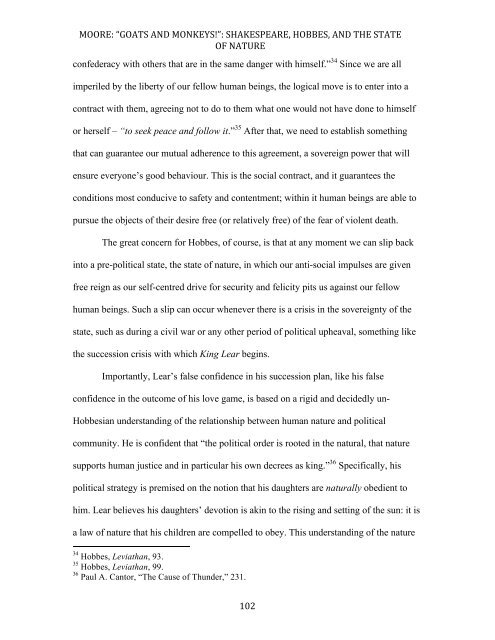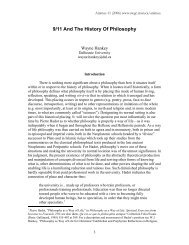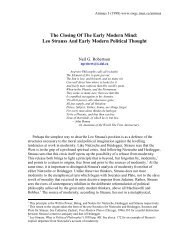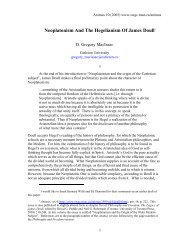âgoats and monkeys!â: shakespeare, hobbes, and the state of nature
âgoats and monkeys!â: shakespeare, hobbes, and the state of nature
âgoats and monkeys!â: shakespeare, hobbes, and the state of nature
Create successful ePaper yourself
Turn your PDF publications into a flip-book with our unique Google optimized e-Paper software.
MOORE: “GOATS AND MONKEYS!”: SHAKESPEARE, HOBBES, AND THE STATE <br />
OF NATURE <br />
confederacy with o<strong>the</strong>rs that are in <strong>the</strong> same danger with himself.” 34 Since we are all<br />
imperiled by <strong>the</strong> liberty <strong>of</strong> our fellow human beings, <strong>the</strong> logical move is to enter into a<br />
contract with <strong>the</strong>m, agreeing not to do to <strong>the</strong>m what one would not have done to himself<br />
or herself – “to seek peace <strong>and</strong> follow it.” 35 After that, we need to establish something<br />
that can guarantee our mutual adherence to this agreement, a sovereign power that will<br />
ensure everyone’s good behaviour. This is <strong>the</strong> social contract, <strong>and</strong> it guarantees <strong>the</strong><br />
conditions most conducive to safety <strong>and</strong> contentment; within it human beings are able to<br />
pursue <strong>the</strong> objects <strong>of</strong> <strong>the</strong>ir desire free (or relatively free) <strong>of</strong> <strong>the</strong> fear <strong>of</strong> violent death.<br />
The great concern for Hobbes, <strong>of</strong> course, is that at any moment we can slip back<br />
into a pre-political <strong>state</strong>, <strong>the</strong> <strong>state</strong> <strong>of</strong> <strong>nature</strong>, in which our anti-social impulses are given<br />
free reign as our self-centred drive for security <strong>and</strong> felicity pits us against our fellow<br />
human beings. Such a slip can occur whenever <strong>the</strong>re is a crisis in <strong>the</strong> sovereignty <strong>of</strong> <strong>the</strong><br />
<strong>state</strong>, such as during a civil war or any o<strong>the</strong>r period <strong>of</strong> political upheaval, something like<br />
<strong>the</strong> succession crisis with which King Lear begins.<br />
Importantly, Lear’s false confidence in his succession plan, like his false<br />
confidence in <strong>the</strong> outcome <strong>of</strong> his love game, is based on a rigid <strong>and</strong> decidedly un-<br />
Hobbesian underst<strong>and</strong>ing <strong>of</strong> <strong>the</strong> relationship between human <strong>nature</strong> <strong>and</strong> political<br />
community. He is confident that “<strong>the</strong> political order is rooted in <strong>the</strong> natural, that <strong>nature</strong><br />
supports human justice <strong>and</strong> in particular his own decrees as king.” 36 Specifically, his<br />
political strategy is premised on <strong>the</strong> notion that his daughters are naturally obedient to<br />
him. Lear believes his daughters’ devotion is akin to <strong>the</strong> rising <strong>and</strong> setting <strong>of</strong> <strong>the</strong> sun: it is<br />
a law <strong>of</strong> <strong>nature</strong> that his children are compelled to obey. This underst<strong>and</strong>ing <strong>of</strong> <strong>the</strong> <strong>nature</strong><br />
34 Hobbes, Leviathan, 93.<br />
35 Hobbes, Leviathan, 99.<br />
36 Paul A. Cantor, “The Cause <strong>of</strong> Thunder,” 231.<br />
102
















